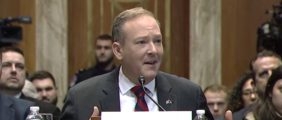Lee Zeldin has taken on the big job of reforming the EPA in his new role as administrator of that agency in the second Donald Trump presidency. Much of that role will involve slowing EPA’s efforts to hamper the U.S. oil and gas industry and rescind many of its heavy-handed regulatory actions of the past four years.
But just as urgent for Zeldin is to speed the agency up in one key area, that of granting primacy to interested states related to permitting what are known as Class VI injection wells, the wells which facilitate carbon capture and storage projects in the U.S. In a new report published Tuesday, big energy analytics and data firm Enverus projects a flood of permit applications for new Class VI wells in the coming months.
“We could see a massive increase in permit approvals in 2025 with more than 40 Class VI applications in line to be approved this year, potentially adding more than 100 mtpa of approved CO2 injection. It appears the wave will be hitting the U.S. soon,” said Brad Johnston, report author and analyst at EIR.
The Enverus report goes on to note that ExxonMobil recently withdrew its Class VI applications for a pair of projects based in Mississippi and Alabama in favor of focusing on its recently finalized 271,000-acre position offshore on the Texas coast of the Gulf of America. But one potential holdup in that ambition is the fact that the EPA under Biden-era Administrator Michael Reagan chose to slow-play Texas’s application for primacy over Class VI well permitting.
To help focus Zeldin’s attention on this key issue, an alliance of Texas business trade associations sent a letter to the administrator on Tuesday urging him to move quickly in the primacy delegation.
“The U.S. Environmental Protection Agency plays a critical role with CCS through its permitting for CO2 storage wells, also known as Class VI wells,” the letter says in part, adding, “Unfortunately, many projects are stalled because of inaction at EPA.”
The authors, who include the leaders of the Texas Oil & Gas Association, the Greater Houston Partnership, the Texas Association of Manufacturers, the Texas Association of Business, the Texas Chemical Council, the Texas Economic Development Council and the Economic Alliance Houston Port Region, point out that Texas is already home to fully one-third of the 161 Class VI permits currently outstanding at EPA. If the Enverus report proves accurate, many more such applications will be coming soon.
It has long been known that the magnitude of CCS opportunity in Texas far exceeds that of any other state. That is why ExxonMobil, long the global leader in carbon capture projects, has focused most of its efforts in the Lone Star State. It is generally agreed that Texas is destined to be the global leader in this sector with the right regulatory environment at the state and federal levels.
During Trump’s first presidency, EPA granted Class VI primacy to both Wyoming and North Dakota. The Biden EPA managed to get around to granting similar primacy to Louisiana last January. All three states have seen excellent growth in their CCS industries since taking on that authority.
But Texas, the state with far and away the biggest opportunity to cut carbon emissions through CCS technology, saw its application stalled by EPA bureaucrats. As the Texas associations point out in their letter, this failure by EPA to act on what should be a real no-brainer of a decision would be highly costly.
The group estimates that, if allowed to proceed, the applications for projects already on file would create 7,500 high-paying jobs, contribute $1.8 billion to the Texas economy, enhance U.S. energy security and strengthen American leadership in global energy matters. The Enverus report points out that, even without the granting of Texas’s primacy application, “CCS through Class VI injection wells nearly tripled in 2024.” Obviously, the pace of growth will only increase whenever Texas is allowed to move ahead.
All that is needed now is for the Trump EPA to start clearing up the backlog the Biden EPA left behind. This really isn’t complicated.
David Blackmon is an energy writer and consultant based in Texas. He spent 40 years in the oil and gas business, where he specialized in public policy and communications.
The views and opinions expressed in this commentary are those of the author and do not reflect the official position of the Daily Caller News Foundation.
All content created by the Daily Caller News Foundation, an independent and nonpartisan newswire service, is available without charge to any legitimate news publisher that can provide a large audience. All republished articles must include our logo, our reporter’s byline and their DCNF affiliation. For any questions about our guidelines or partnering with us, please contact licensing@dailycallernewsfoundation.org.

























